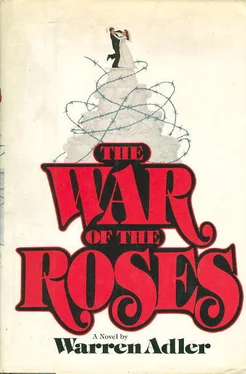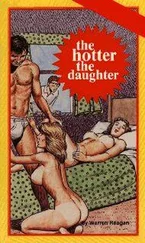As it fell his body did not escape completely, and the armoire caught his shoe by its sole and badly twisted his ankle. The pain stabbed him. But he managed to contort his body, untie his shoelace, and painfully extract his foot from the trapped shoe.
Whiskey oozed from under the armoire, soaking through his clothes, its acrid smell permeating the room.
If she was up in her room, she surely had heard the crash. He had no illusions about her motives. This caper was no mere annoyance. It was the real thing. He crawled across the library floor, where a confused Benny had been startled to wakefulness by the noise of the crash. He felt Benny’s warm tongue on his face. ‘Good old Benny,’ he whispered, embracing him, breathing in his doggy odor. It was more welcome than that of the liquor and perspiration in which he was soaked.
Raising himself on one leg, he managed to hop to the phone. It was, he was relieved to find, still functioning and he called a cab, then crawled outside to wait for it.
‘You’re lucky it’s not broken,’ the black intern in the emergency room of the Washington Hospital Center told him. He shook his head. ‘You’d better get off the juice. This is what always happens.’
‘I’m not on it.’ ,
‘You stink like a brewery.’
Oliver felt the futility of responding. Who would believe him? He accepted a shot of painkiller and went back to the house.
But before he went to sleep, he Scotch-taped a note to her door. The shock had weakened him and the scrawl and wispy and uncertain.
‘You had better watch your ass,’ he had written. Like her notes, it was unsigned.
He woke up in a puddle of sweat. Every muscle ached. He felt stiff, ravaged, and his ankle throbbed. With the air conditioning not working, there was not a stir of air in the room.
He posed a question to himself: Is this me? Searching his mind, he looked for glimpses of identification. He spelled his name, whispered his Social Security number, his date of birth, the name of his law firm, the address of his house, the names of his children. Superficial, he decided, half-amused, certain that the pained hulk lying moist and terrified in the two-hundred-year-old canopied bed was not himself at all.
Himself, he declared, was a forty-year-old man named Oliver Rose, with two beautiful children, Eve and Josh, and a lovely, loyal, beautiful, wonderful wife named Barbara.
The name set off a musical lilt in his mind. Barbara.
Dear Barbara. Whatever had happened to her? Where was everybody?
He had lived with and loved someone for nearly two decades and all she was, was an object of his imagination, something without substance or reality. He wished he could blot her from his mind, all the years, all the false roles.
He got out of bed and opened the drapes to the rising sun. Opening the windows, he was disappointed to discover that the outside air was as hot as it was inside. He had forgotten how hot it was inside. He had forgotten how hot a Washington summer could be.
Something was missing in the room. Benny wasn’t there. Somehow he had got lost in the shuffle of last night’s events. Sticking his head out the window, Oliver shouted the dog’s name, then* listened for his familiar bark. Yet he wasn’t worried about Benny. Benny could take care of himself.
Inadvertently, as he moved toward the bathroom he put too much weight on his ankle and crashed against the wall in agony; it took some time to gather his strength again. Peering at his worn face in the bathroom mirror, he felt the odd sensation of personal liberation. He actually felt good, and he couldn’t believe it. He searched his mind for a reason. For the first time since Barbara had shocked him with her admission, he now felt the complete absence of doubt. He had no more illusions. He knew the real score. The lines were clearly drawn. The bitch would not be satisfied until she had his balls in her hand. Never, never, he vowed. It was the moment of truth. Basic hate. Basic war.
He winked at his image in the mirror and, making a fist, shook it in front of his face. There was no undue heat to his anger now. The cutting edge was cool. He knew what he had to do. He picked up the phone.
‘I’ll be away for a few days,’ he told Miss Harlow.
‘You need a vacation, Mr. Rose.’
He paused, deliberately giving weight to suggestion.
‘I know what I need,’ he whispered, hanging up.
She had always hated the armoire in the library. Big, bulky, and overpowering, it was, as she saw it, typical of some compensating masculine desire for bigness. Sawing the front legs where they joined the cabinet and cementing the front doors had been practically a labor of love.
But she had expected, and hoped for, a larger crash. Perhaps she hadn’t quite thought it through and applied the energy and zeal that he had expended to booby-trap her kitchen or ruin her food. What she had done to his Ferrari she dismissed as ‘compulsive inspiration.’ Of course, he was more adept mechanically than she. It was time, she decided, to get tough, really tough. She was prepared to devote herself totally to the task. Like everything else, this chore, too, she would have to take on herself. Thurmont, she decided, was only out to line his pockets.
With her children safely tucked away at camp, the house empty, she was free to maneuver. She’d drive him out of the house or die trying, she vowed.
The armoire tactic, although disappointing, could be considered a warning of things to come. From her window she had seen him hobble off to a waiting taxi with what seemed like a comparatively minor injury. Then she had heard him return and limp up the stairs.
The night was unbearably hot and she had opened the windows. The sounds of the city were unfamiliar and that and the heat and listening for Oliver inhibited her sleep. As daylight emerged she got up, showered, and, surprisingly, felt refreshed.
As she quietly closed her door she saw the note he had written. Removing it, she scrawled a line in lipstick and reattached it to his door.
‘Hell is coming,’ the note read.
Holding her shoes in her hand, she moved downstairs stealthily to the kitchen. She removed the containers of still-frozen pate and chicken galantine from the freezer and loaded them into her car. She had decided that rather than let them spoil, she would give them as gifts to her various customers, those that she could still count on. She had written off her recent dinner guests. Her mortification lingered. She hoped she would never have to face any of them again. As for the others, she hoped they would remember her generosity. Adversity, she had found, spawned resourcefulness.
The next few weeks would be slow, businesswise, anyway. Most people fled Washington in the summer, at least from mid-July to the end of August. She had more immediate and pressing problems on her mind.
Although she wasn’t used to anticipating events, she moved some cartons of canned goods and perishables from the refrigerator up to her room. Just in case, she told herself, proud of her newfound wiliness. In case of what? she wondered. But that thought did not diminish her new feelings of pride and self-reliance.
‘I’ll be away for a while,’ she told the proprietor of the French Market, who accepted her pate with a flourish and a kiss on both cheeks. It took her three hours to make her rounds.
Returning, she let herself in through the back door. Cautiously, she ascended the back stairs as if she were walking through a minefield. She must learn to be alert, she told herself, wondering if he was still in his room.
A note was Scotch-taped to her door, scribbled on a piece of jagged cardboard ripped from a piece used as backing for laundered shirts. He had torn away the note she had pasted on his door.
Читать дальше












